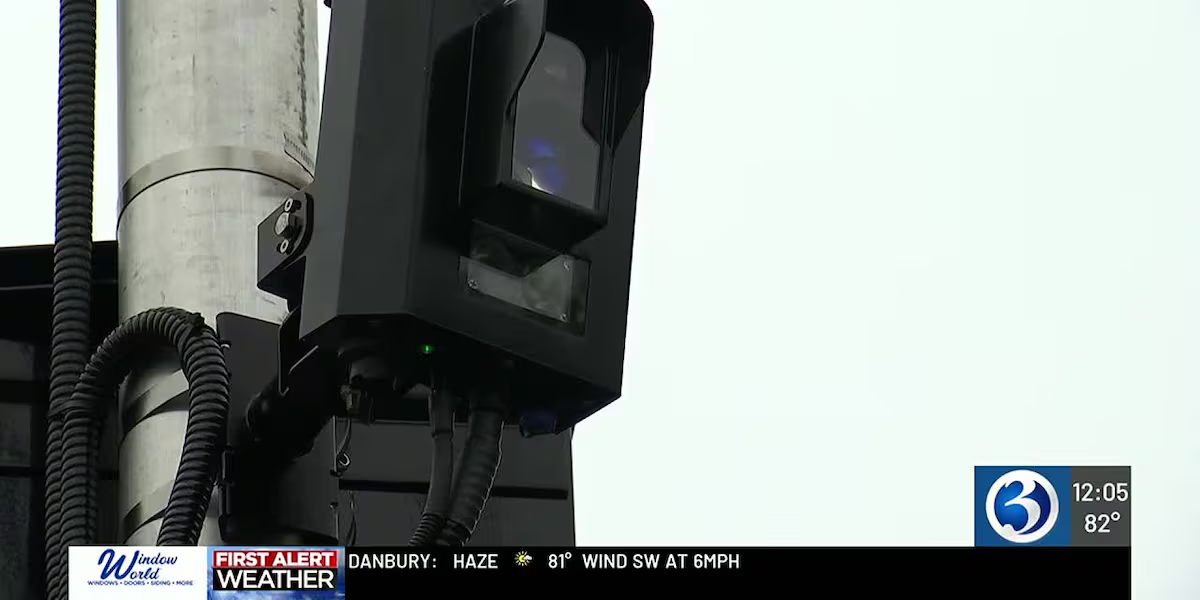I-TEAM: Are CT speed cameras about public safety or money? I-Team takes concerns to local towns

STORRS, Conn. (WFSB) – Are speed cameras in Connecticut about public safety, or money? The technology has drivers asking questions, while police tell the I-Team they’re doing their job, lowering speeds across the state. For the next three days, the I-Team is digging into the issue, traveling the towns currently using them.
Washington speed camera concerns; town says they’ve fixed previous issues
The town of Washington was the first to put speed cameras up. Originally, the town had several cameras running on Old Litchfield Road/Route 109, but tell us after complaints from property owners, they have just one running currently, in the 100-200 block of Old Litchfield.
Citations started going out on May 14th. As of October 30th, the town has sent out 11,776 citations, worth $590,990. Of those citations $408,225.00 has been paid. After paying vendors, the town has collected $182,765.00.
But many receiving citations are asking online, whether they are legitimate?
One of those people is Carrie Neri. Neri often visits her mother in Morris. During one of those trips, found herself in Washington. “I had to take her cat to the vet, and I thought I would go get her lunch at her favorite restaurant which was in Washington,” says Neri. That visit to Washington in June ended up costing Neri a little more than lunch.
Neri got a speed enforcement citation in the mail a few days later, telling her she owed the town $50. The town’s speed camera on Old Litchfield Road showed Neri had been going 14 miles per hour over the speed limit: 49 mph. She feels that’s wrong. “I was a little bit surprised because the road that goes from my mom’s house to the pantry is very windy and narrow and you really can’t drive fast on it,” says Neri. “I had no documentation to show that I wasn’t going that fast, so I was just going to pay the $50 and be done with it.”
As a former auditor, Neri started doing her research, finding others who had driven through town, who had questions about the legitimacy of their tickets. One in particular, a bus driver who said his ticket was overturned, after the bus’s internal GPS showed he wasn’t speeding. “When I looked online, there were too many red flags,” says Neri.
The I-Team saw the same talk and started digging. Our research revealed something interesting, mentioned in a Board of Selectmen meeting on June 5th. Before giving his speed enforcement camera update, First Selectman James Brinton told the board, “this has not been a smooth rollout.” He went on to say the camera where Neri got her ticket was having problems, according to the vendor. “They’re struggling with the technology. The units that were up, they’re now all replacing them because they are losing connectivity.”
Neri was issued a citation the next day, June 6th. We sat down with Officer Richard Innaimo, Washington’s only full-time police officer. He’s in charge of reviewing each violation that comes in from the cameras and deciding whether or not a citation is issued.
“When we review each ticket that goes through, there are certain parameters. There has to be a box that lines up with the license plate. If that’s not lining up, we reject the ticket,” says Officer Innaimo.
More than two thousand citations have been rejected since the cameras went live in May. “For either not lining up, maybe you can’t see the plate right away. If I’m not too sure on the plate, if it’s blurred, we’re not going to issue a ticket,” says Officer Innaimo. He says sometimes the computer reads a number wrong. He admits, “mistakes do get made, but we’ll gladly look at every one of them.”
In the case of the bus driver, Officer Innaimo says, “I went back and talked to the camera company about his ticket in particular. The square box, basically the little tracking system, wasn’t lined up correctly. 14:15 The camera company basically told me it could have been a car that had passed him or coming the other way. That’s when the system was relatively new.”
Was Neri’s ticket a mistake? We asked Officer Innaimo, because of the connectivity issues, and new software being installed, if the cameras should have stopped issuing citations during that time. “Any citation that went out then, if it met those parameters of everything, all the boxes were checked, no. No.
Officer Innaimo says the connectivity issues, which weren’t 24/7, actually prevented citations from going out whenever the cameras wouldn’t connect. “We would hear from the company that does all the hardware regarding the cameras, saying they weren’t able to communicate with the camera and send us the pictures of anybody speeding,” says Officer Innaimo.
We still had more questions. According to Neri’s citation, the cameras that caught her speeding were calibrated in mid-May. Those same cameras were re-calibrated July 2nd, after software updates. We asked if tickets between May 26th, when Neri’s camera was calibrated, and July 2nd, would be valid. “They’re valid – because that calibration lasts,” says Officer Innaimo. State law requires cameras only be calibrated once a year. “Being this is an electronic device that’s stationary, not being moved around, that calibration is sufficient that the company is doing.”
Officer Innaimo says he understands people have questions and he’s happy to give the answers. But he wants residents to know, the cameras have slowed speeds.
When asked about some of the most common criticism, that the cameras are a money grab, Officer Innaimo says, “I tell people this all the time. Very few things are in our control as far as money we have to pay out when it comes to taxes. This is well within your control to not be fined, just slow down.”
Ultimately, Neri’s ticket was not dismissed, after she tried to contest it. She could have appealed but, “I live an hour and a half away, I don’t go up there that often, I’m not going to contest it in person. At that point, it wasn’t worth it to fight the $50.” She still thinks the questions were worth asking. If you do want to appeal your ticket, on Tuesday, we will show you how, and what legal arguments one attorney says you should or shouldn’t make.
In Washington, the first offense carries a $50 fine, while subsequent offenses are $75. Fines are capped at $75, and any revenue generated must be used for roadway safety initiatives.
Another speed camera will be installed on Baldwin Hill Road in the near future in Washington, according to the town. Under state law, towns and cities must submit plans for the state Department of Transportation’s approval before they can use red light or speed cameras to enforce traffic laws.
Copyright 2025 WFSB. All rights reserved.





